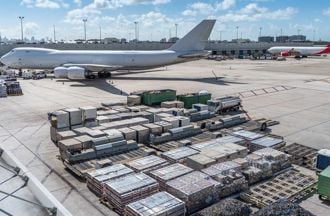
Geneva – The International Air Transport Association (IATA) has released the updated 2026 editions of key industry manuals for cargo and ground operations, which incorporate close to 100 major changes and revisions to align with evolving global standards.
The main changes to the 2026 manuals include:
Dangerous Goods Regulations (DGR) and Battery Shipping Regulations (BSR)
Battery-related updates dominate the DGR and BSR for 2026.
The number of lithium batteries transported as cargo by air have surged 25% year-on-year [1]. At the same time, the industry has seen several incidents involving overheating power banks on aircraft, contributing to the need for revised regulations around the shipment of lithium batteries.
The past year has also seen the emergence of new hybrid battery chemistries—particularly those used in hybrid vehicles—requiring updated shipping requirements.
The key changes to the 2026 DGR include:
- The introduction of formalized shipping names for hybrid-powered vehicles
- Recommendations on the use of power banks and spare batteries by passengers in the cabin
- Updated variations for Thailand, France and United Kingdom
- Standardized text for 290 existing operator variations
- Additional guidance regarding safety data sheets required for certain dangerous goods
- The inclusion of Appendix H, which sets out a number of changes expected in 2027
The key changes to the 2026 BSR include:
- Stricter charge limits for lithium-ion batteries packed with equipment
- New shipper compliance checklist for battery shipments
- Additional Designated Postal Operators that may accept equipment containing lithium batteries
Live Animals Regulations (LAR)
IATA’s LAR has been significantly updated to further improve animal welfare. IATA data shows that more than 200,000 non-domestic animal shipments were made in 2024 [1], highlighting a need to maintain high standards of care. There have been major changes to container requirements and guidance on training for attendants handling animals during transit.
The key changes include:
- Guidelines for attendants on providing appropriate and safe care during transit, including standardized Competency-Based Training Assessment recommendations
- Inclusion of Brazil, which in 2025 officially adopted the LAR
- New material and ventilation specifications for animal containers
- Updated guidelines for poultry, pangolins, hooded raptors and birds of prey
IATA Ground Operations Manual (IGOM)
The 2026 IGOM focuses on improvements to operational efficiency and safety across passenger, baggage, and aircraft handling operations, with a particular focus on passengers that require special support.
The key changes include:
- New guidelines for unaccompanied minors, unruly passengers, inadmissible passengers and those needing medical assistance
- Baggage tracking guidelines aligned with IATA Resolution 753
- Updated procedures to address preparation, collection and transportation of potable water
- Revised aircraft turnaround procedures
Digital Tools
Several new digital enhancements to the manuals make it easier for cargo professionals to quickly access information. These include:
- Launch of IATA’s online portal LAR Verify, enabling airlines, shippers and freight forwarders to digitally access the LAR while providing an automated compliance solution
- A comprehensive list of dangerous goods in digital format
- An improved battery classification tool which now includes sodium-ion batteries
“Global standards have made flying safe and reliable. For eight decades, IATA’s member airlines have worked with the industry value chain, including regulators, on standard setting and best practices critical to daily operations. This year’s IATA manuals updates reflect advancements in technology, digitalization, regulation, and customer needs that are critical for safer, more efficient, and increasingly sustainable operations,” said Frederic Leger, IATA’s Senior Vice President of Products and Services.
For more information, please contact:
Corporate Communications
Tel: +41 22 770 2967
Email: corpcomms@iata.org
Notes for Editors:
- IATA (International Air Transport Association) represents over 360 airlines accounting for some 85% of global air traffic.
- You can follow us on X for announcements, policy positions, and other useful industry information.
- Fly Net Zero
- [1] Data from IATA CargoIS

